A Comparative Analysis of Business Ethics Approaches and Tests
VerifiedAdded on 2020/03/04
|6
|1209
|305
Essay
AI Summary
This essay provides a comprehensive overview of business ethics, beginning with a definition of ethics and its role in the business environment. It then delves into the differences between descriptive and normative ethics, exploring how people behave and the creation of moral standards, respectively. The essay further examines three major approaches to business ethics: the conventional approach, the principles approach, and the ethical tests approach. The conventional approach compares decisions with existing norms, while the principles approach emphasizes golden rules and utilitarian ethics. The ethical tests approach, based on practice, guides decision-making through practical questions. The essay concludes by referencing relevant sources to support its analysis, providing a solid foundation for understanding business ethics.

Business Ethics
[Name of the Student]
[Student ID]
[Name of the Student]
[Student ID]
Paraphrase This Document
Need a fresh take? Get an instant paraphrase of this document with our AI Paraphraser
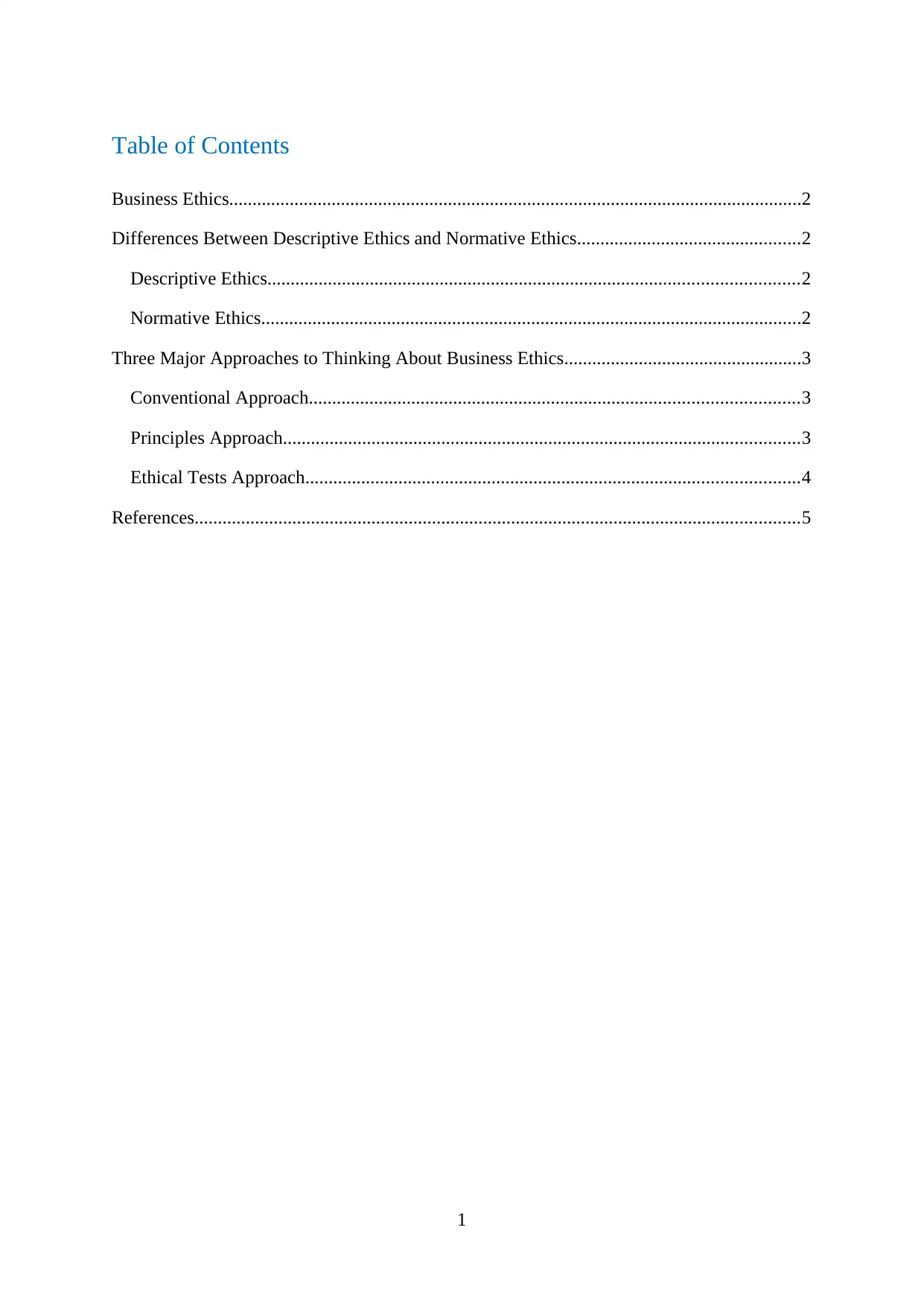
Table of Contents
Business Ethics...........................................................................................................................2
Differences Between Descriptive Ethics and Normative Ethics................................................2
Descriptive Ethics..................................................................................................................2
Normative Ethics....................................................................................................................2
Three Major Approaches to Thinking About Business Ethics...................................................3
Conventional Approach.........................................................................................................3
Principles Approach...............................................................................................................3
Ethical Tests Approach..........................................................................................................4
References..................................................................................................................................5
1
Business Ethics...........................................................................................................................2
Differences Between Descriptive Ethics and Normative Ethics................................................2
Descriptive Ethics..................................................................................................................2
Normative Ethics....................................................................................................................2
Three Major Approaches to Thinking About Business Ethics...................................................3
Conventional Approach.........................................................................................................3
Principles Approach...............................................................................................................3
Ethical Tests Approach..........................................................................................................4
References..................................................................................................................................5
1
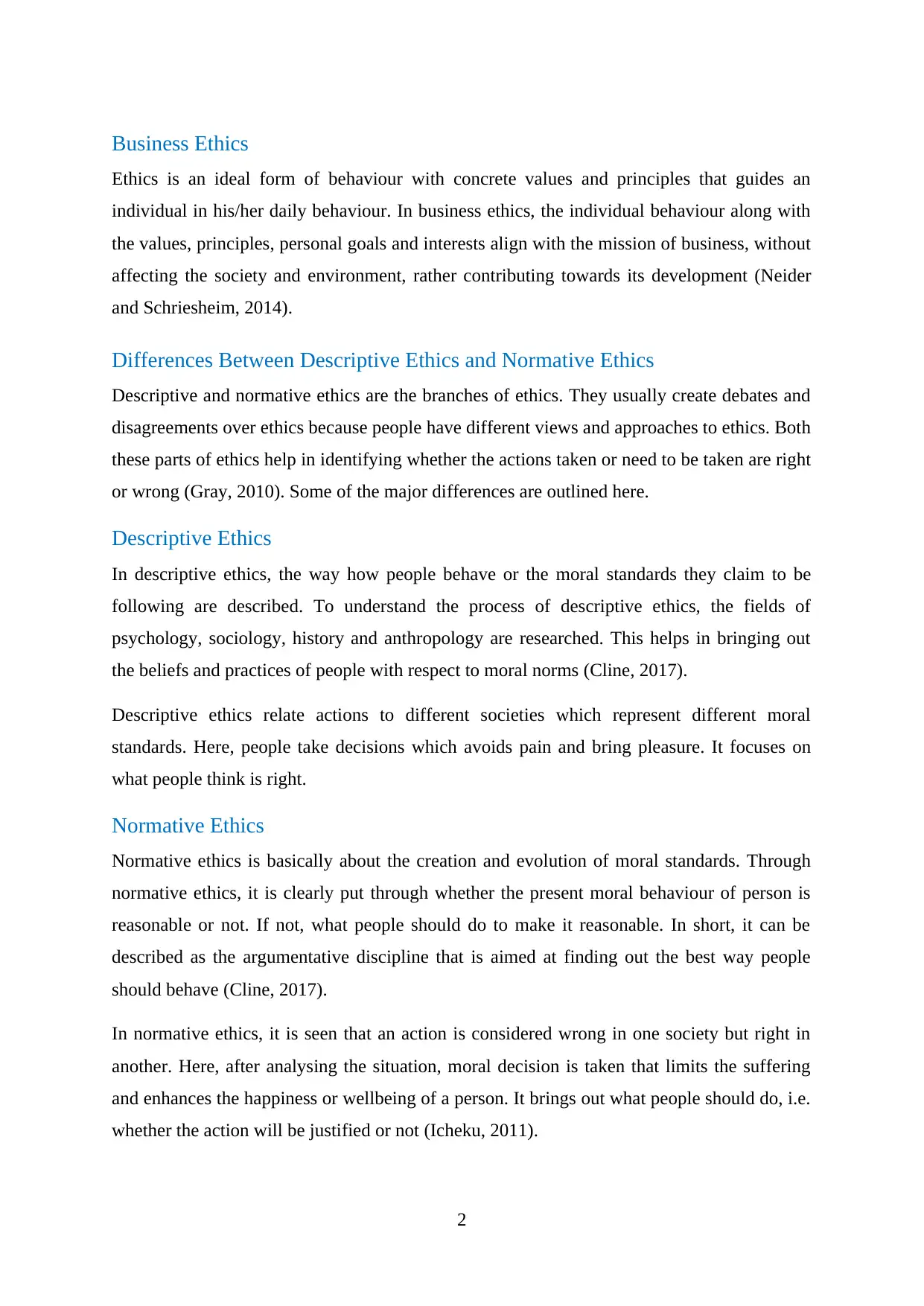
Business Ethics
Ethics is an ideal form of behaviour with concrete values and principles that guides an
individual in his/her daily behaviour. In business ethics, the individual behaviour along with
the values, principles, personal goals and interests align with the mission of business, without
affecting the society and environment, rather contributing towards its development (Neider
and Schriesheim, 2014).
Differences Between Descriptive Ethics and Normative Ethics
Descriptive and normative ethics are the branches of ethics. They usually create debates and
disagreements over ethics because people have different views and approaches to ethics. Both
these parts of ethics help in identifying whether the actions taken or need to be taken are right
or wrong (Gray, 2010). Some of the major differences are outlined here.
Descriptive Ethics
In descriptive ethics, the way how people behave or the moral standards they claim to be
following are described. To understand the process of descriptive ethics, the fields of
psychology, sociology, history and anthropology are researched. This helps in bringing out
the beliefs and practices of people with respect to moral norms (Cline, 2017).
Descriptive ethics relate actions to different societies which represent different moral
standards. Here, people take decisions which avoids pain and bring pleasure. It focuses on
what people think is right.
Normative Ethics
Normative ethics is basically about the creation and evolution of moral standards. Through
normative ethics, it is clearly put through whether the present moral behaviour of person is
reasonable or not. If not, what people should do to make it reasonable. In short, it can be
described as the argumentative discipline that is aimed at finding out the best way people
should behave (Cline, 2017).
In normative ethics, it is seen that an action is considered wrong in one society but right in
another. Here, after analysing the situation, moral decision is taken that limits the suffering
and enhances the happiness or wellbeing of a person. It brings out what people should do, i.e.
whether the action will be justified or not (Icheku, 2011).
2
Ethics is an ideal form of behaviour with concrete values and principles that guides an
individual in his/her daily behaviour. In business ethics, the individual behaviour along with
the values, principles, personal goals and interests align with the mission of business, without
affecting the society and environment, rather contributing towards its development (Neider
and Schriesheim, 2014).
Differences Between Descriptive Ethics and Normative Ethics
Descriptive and normative ethics are the branches of ethics. They usually create debates and
disagreements over ethics because people have different views and approaches to ethics. Both
these parts of ethics help in identifying whether the actions taken or need to be taken are right
or wrong (Gray, 2010). Some of the major differences are outlined here.
Descriptive Ethics
In descriptive ethics, the way how people behave or the moral standards they claim to be
following are described. To understand the process of descriptive ethics, the fields of
psychology, sociology, history and anthropology are researched. This helps in bringing out
the beliefs and practices of people with respect to moral norms (Cline, 2017).
Descriptive ethics relate actions to different societies which represent different moral
standards. Here, people take decisions which avoids pain and bring pleasure. It focuses on
what people think is right.
Normative Ethics
Normative ethics is basically about the creation and evolution of moral standards. Through
normative ethics, it is clearly put through whether the present moral behaviour of person is
reasonable or not. If not, what people should do to make it reasonable. In short, it can be
described as the argumentative discipline that is aimed at finding out the best way people
should behave (Cline, 2017).
In normative ethics, it is seen that an action is considered wrong in one society but right in
another. Here, after analysing the situation, moral decision is taken that limits the suffering
and enhances the happiness or wellbeing of a person. It brings out what people should do, i.e.
whether the action will be justified or not (Icheku, 2011).
2
⊘ This is a preview!⊘
Do you want full access?
Subscribe today to unlock all pages.

Trusted by 1+ million students worldwide
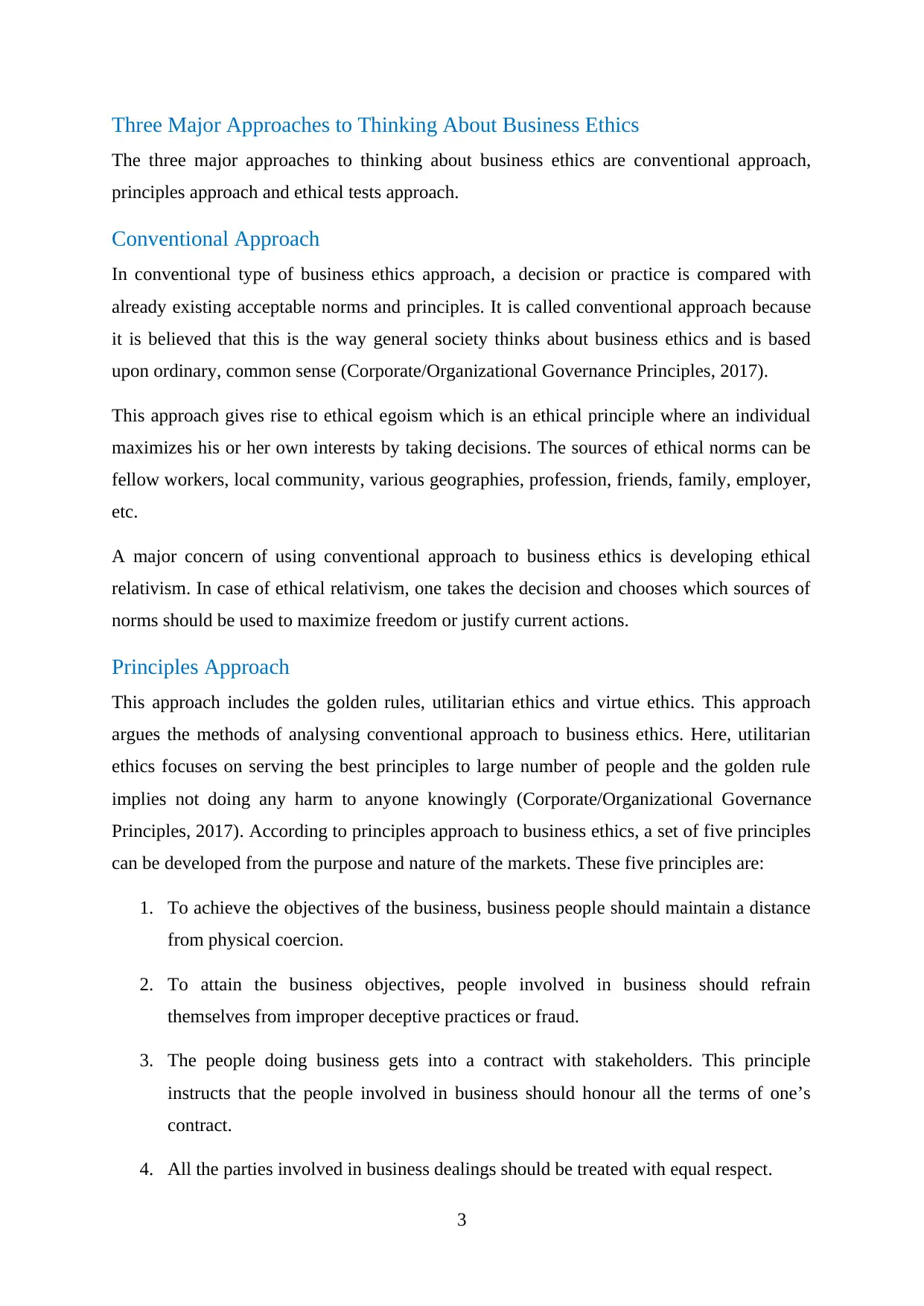
Three Major Approaches to Thinking About Business Ethics
The three major approaches to thinking about business ethics are conventional approach,
principles approach and ethical tests approach.
Conventional Approach
In conventional type of business ethics approach, a decision or practice is compared with
already existing acceptable norms and principles. It is called conventional approach because
it is believed that this is the way general society thinks about business ethics and is based
upon ordinary, common sense (Corporate/Organizational Governance Principles, 2017).
This approach gives rise to ethical egoism which is an ethical principle where an individual
maximizes his or her own interests by taking decisions. The sources of ethical norms can be
fellow workers, local community, various geographies, profession, friends, family, employer,
etc.
A major concern of using conventional approach to business ethics is developing ethical
relativism. In case of ethical relativism, one takes the decision and chooses which sources of
norms should be used to maximize freedom or justify current actions.
Principles Approach
This approach includes the golden rules, utilitarian ethics and virtue ethics. This approach
argues the methods of analysing conventional approach to business ethics. Here, utilitarian
ethics focuses on serving the best principles to large number of people and the golden rule
implies not doing any harm to anyone knowingly (Corporate/Organizational Governance
Principles, 2017). According to principles approach to business ethics, a set of five principles
can be developed from the purpose and nature of the markets. These five principles are:
1. To achieve the objectives of the business, business people should maintain a distance
from physical coercion.
2. To attain the business objectives, people involved in business should refrain
themselves from improper deceptive practices or fraud.
3. The people doing business gets into a contract with stakeholders. This principle
instructs that the people involved in business should honour all the terms of one’s
contract.
4. All the parties involved in business dealings should be treated with equal respect.
3
The three major approaches to thinking about business ethics are conventional approach,
principles approach and ethical tests approach.
Conventional Approach
In conventional type of business ethics approach, a decision or practice is compared with
already existing acceptable norms and principles. It is called conventional approach because
it is believed that this is the way general society thinks about business ethics and is based
upon ordinary, common sense (Corporate/Organizational Governance Principles, 2017).
This approach gives rise to ethical egoism which is an ethical principle where an individual
maximizes his or her own interests by taking decisions. The sources of ethical norms can be
fellow workers, local community, various geographies, profession, friends, family, employer,
etc.
A major concern of using conventional approach to business ethics is developing ethical
relativism. In case of ethical relativism, one takes the decision and chooses which sources of
norms should be used to maximize freedom or justify current actions.
Principles Approach
This approach includes the golden rules, utilitarian ethics and virtue ethics. This approach
argues the methods of analysing conventional approach to business ethics. Here, utilitarian
ethics focuses on serving the best principles to large number of people and the golden rule
implies not doing any harm to anyone knowingly (Corporate/Organizational Governance
Principles, 2017). According to principles approach to business ethics, a set of five principles
can be developed from the purpose and nature of the markets. These five principles are:
1. To achieve the objectives of the business, business people should maintain a distance
from physical coercion.
2. To attain the business objectives, people involved in business should refrain
themselves from improper deceptive practices or fraud.
3. The people doing business gets into a contract with stakeholders. This principle
instructs that the people involved in business should honour all the terms of one’s
contract.
4. All the parties involved in business dealings should be treated with equal respect.
3
Paraphrase This Document
Need a fresh take? Get an instant paraphrase of this document with our AI Paraphraser
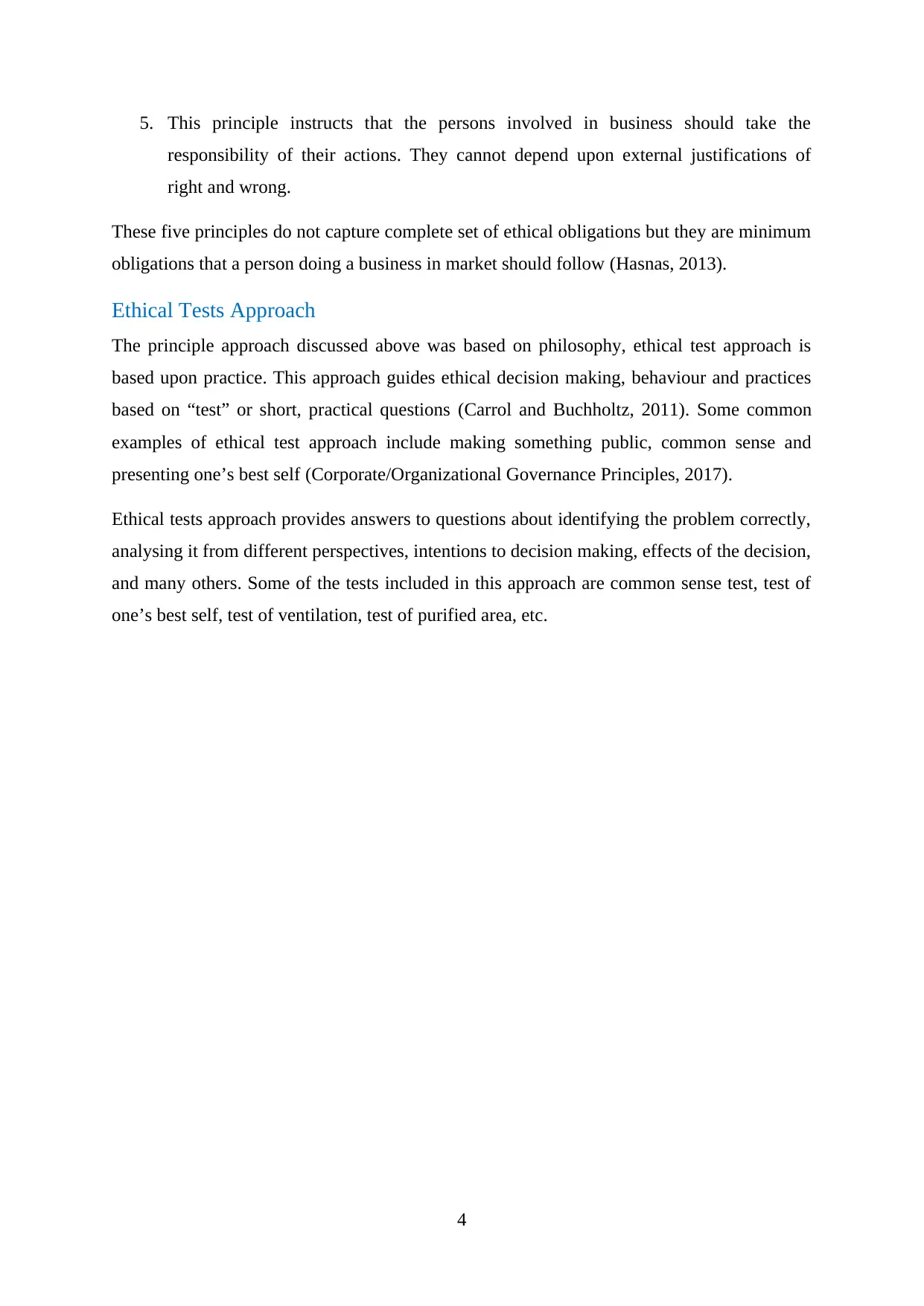
5. This principle instructs that the persons involved in business should take the
responsibility of their actions. They cannot depend upon external justifications of
right and wrong.
These five principles do not capture complete set of ethical obligations but they are minimum
obligations that a person doing a business in market should follow (Hasnas, 2013).
Ethical Tests Approach
The principle approach discussed above was based on philosophy, ethical test approach is
based upon practice. This approach guides ethical decision making, behaviour and practices
based on “test” or short, practical questions (Carrol and Buchholtz, 2011). Some common
examples of ethical test approach include making something public, common sense and
presenting one’s best self (Corporate/Organizational Governance Principles, 2017).
Ethical tests approach provides answers to questions about identifying the problem correctly,
analysing it from different perspectives, intentions to decision making, effects of the decision,
and many others. Some of the tests included in this approach are common sense test, test of
one’s best self, test of ventilation, test of purified area, etc.
4
responsibility of their actions. They cannot depend upon external justifications of
right and wrong.
These five principles do not capture complete set of ethical obligations but they are minimum
obligations that a person doing a business in market should follow (Hasnas, 2013).
Ethical Tests Approach
The principle approach discussed above was based on philosophy, ethical test approach is
based upon practice. This approach guides ethical decision making, behaviour and practices
based on “test” or short, practical questions (Carrol and Buchholtz, 2011). Some common
examples of ethical test approach include making something public, common sense and
presenting one’s best self (Corporate/Organizational Governance Principles, 2017).
Ethical tests approach provides answers to questions about identifying the problem correctly,
analysing it from different perspectives, intentions to decision making, effects of the decision,
and many others. Some of the tests included in this approach are common sense test, test of
one’s best self, test of ventilation, test of purified area, etc.
4
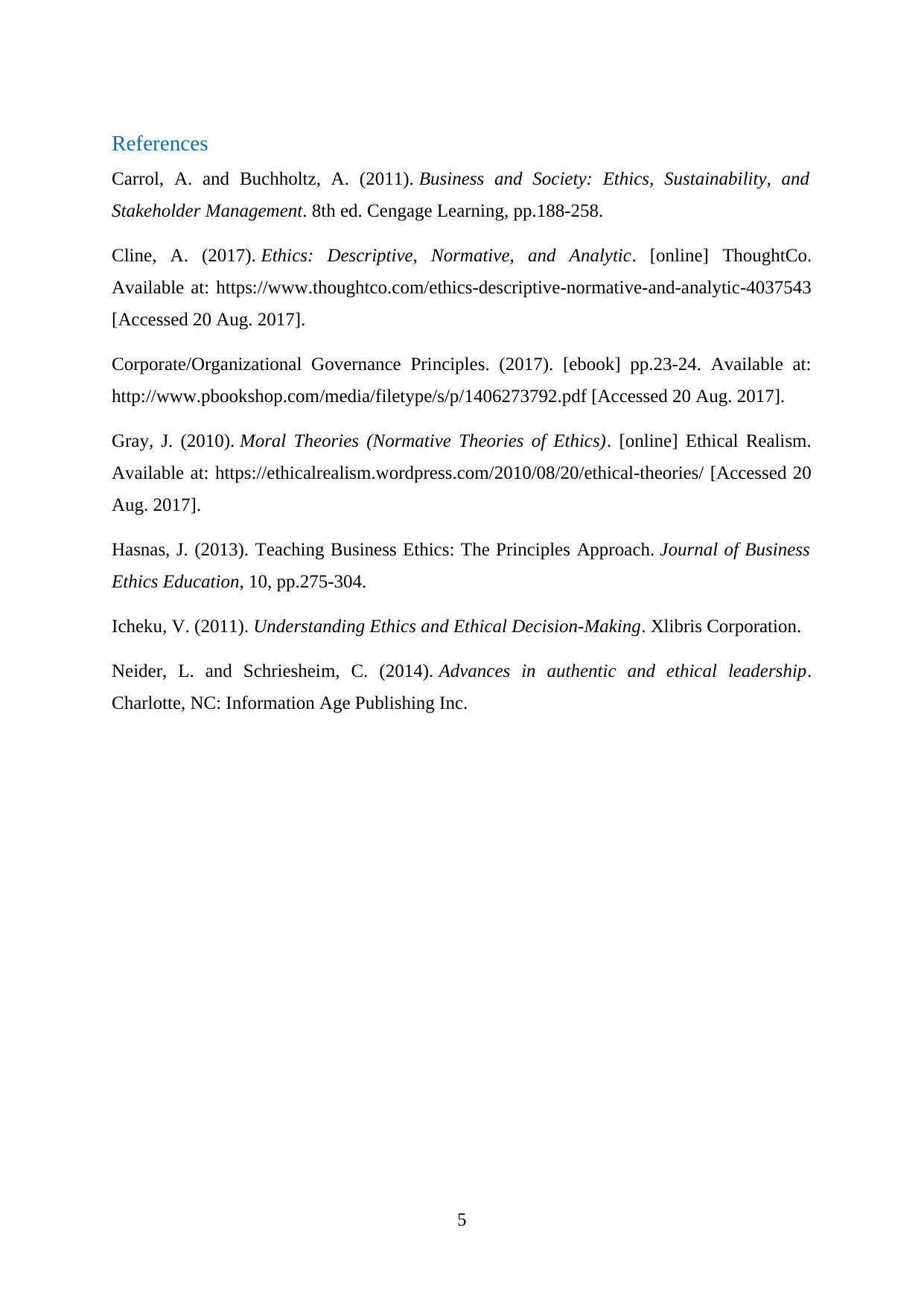
References
Carrol, A. and Buchholtz, A. (2011). Business and Society: Ethics, Sustainability, and
Stakeholder Management. 8th ed. Cengage Learning, pp.188-258.
Cline, A. (2017). Ethics: Descriptive, Normative, and Analytic. [online] ThoughtCo.
Available at: https://www.thoughtco.com/ethics-descriptive-normative-and-analytic-4037543
[Accessed 20 Aug. 2017].
Corporate/Organizational Governance Principles. (2017). [ebook] pp.23-24. Available at:
http://www.pbookshop.com/media/filetype/s/p/1406273792.pdf [Accessed 20 Aug. 2017].
Gray, J. (2010). Moral Theories (Normative Theories of Ethics). [online] Ethical Realism.
Available at: https://ethicalrealism.wordpress.com/2010/08/20/ethical-theories/ [Accessed 20
Aug. 2017].
Hasnas, J. (2013). Teaching Business Ethics: The Principles Approach. Journal of Business
Ethics Education, 10, pp.275-304.
Icheku, V. (2011). Understanding Ethics and Ethical Decision-Making. Xlibris Corporation.
Neider, L. and Schriesheim, C. (2014). Advances in authentic and ethical leadership.
Charlotte, NC: Information Age Publishing Inc.
5
Carrol, A. and Buchholtz, A. (2011). Business and Society: Ethics, Sustainability, and
Stakeholder Management. 8th ed. Cengage Learning, pp.188-258.
Cline, A. (2017). Ethics: Descriptive, Normative, and Analytic. [online] ThoughtCo.
Available at: https://www.thoughtco.com/ethics-descriptive-normative-and-analytic-4037543
[Accessed 20 Aug. 2017].
Corporate/Organizational Governance Principles. (2017). [ebook] pp.23-24. Available at:
http://www.pbookshop.com/media/filetype/s/p/1406273792.pdf [Accessed 20 Aug. 2017].
Gray, J. (2010). Moral Theories (Normative Theories of Ethics). [online] Ethical Realism.
Available at: https://ethicalrealism.wordpress.com/2010/08/20/ethical-theories/ [Accessed 20
Aug. 2017].
Hasnas, J. (2013). Teaching Business Ethics: The Principles Approach. Journal of Business
Ethics Education, 10, pp.275-304.
Icheku, V. (2011). Understanding Ethics and Ethical Decision-Making. Xlibris Corporation.
Neider, L. and Schriesheim, C. (2014). Advances in authentic and ethical leadership.
Charlotte, NC: Information Age Publishing Inc.
5
⊘ This is a preview!⊘
Do you want full access?
Subscribe today to unlock all pages.

Trusted by 1+ million students worldwide
1 out of 6
Related Documents
Your All-in-One AI-Powered Toolkit for Academic Success.
+13062052269
info@desklib.com
Available 24*7 on WhatsApp / Email
![[object Object]](/_next/static/media/star-bottom.7253800d.svg)
Unlock your academic potential
Copyright © 2020–2026 A2Z Services. All Rights Reserved. Developed and managed by ZUCOL.





